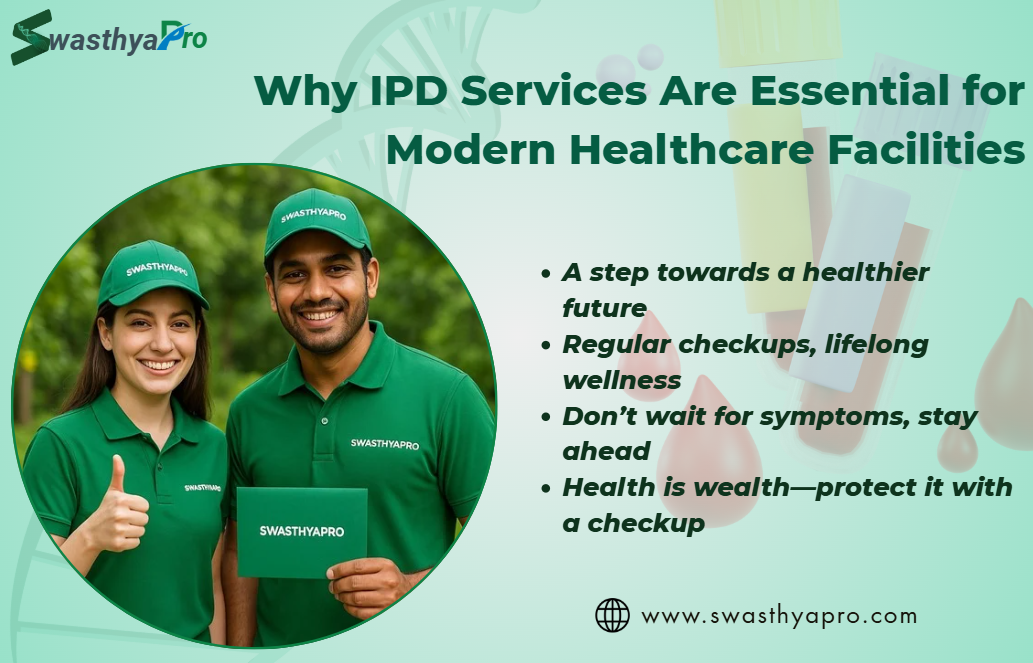Why IPD Services Are Essential for Modern Healthcare Facilities

In today’s fast-changing healthcare environment, IPD services play a crucial role in ensuring patients receive comprehensive and continuous care during hospitalization. While outpatient services handle routine consultations, it is the in-patient department (IPD) that manages complex treatments, surgeries, and long-term monitoring. Modern hospitals cannot function effectively without well-organized IPD services, as they form the foundation of care delivery, patient safety, and clinical excellence.
Understanding the Importance of IPD Services
IPD services refer to the facilities and processes provided to patients admitted into a hospital for more than 24 hours. These services extend from admission and diagnosis to surgery, post-operative care, and rehabilitation. Unlike outpatient services, which are typically short-term, IPD services cover every aspect of a patient’s journey inside the hospital.
In modern healthcare, the complexity of diseases, the rise of chronic conditions, and the demand for advanced surgeries have made IPD services more essential than ever. Hospitals without strong IPD units often struggle to deliver consistent, high-quality care.
The Central Role of IPD Services in Hospitals
The presence of IPD services ensures that hospitals can go beyond primary consultations to offer advanced treatments. Patients requiring continuous observation, specialized care, and emergency interventions rely on inpatient facilities.
From intensive care units (ICUs) to maternity wards and surgical departments, IPD services are the backbone of patient care. They not only provide medical treatment but also integrate nursing, diagnostic, and rehabilitation support, making them indispensable for modern hospitals.
Key Components of IPD Services
-
Admission and Bed Management
An efficient admission process is the starting point of strong IPD services. Proper bed allocation systems ensure patients are accommodated quickly and without unnecessary delays. -
Round-the-Clock Nursing Care
Nursing staff form the heart of IPD services, providing medication, monitoring vital signs, and supporting patients’ emotional needs. High-quality nursing ensures safe recovery. -
Diagnostic and Imaging Support
Inpatients often require continuous testing and imaging. Integration of diagnostic services within IPD services ensures quick results, enabling faster treatment decisions. -
Surgical and Specialist Care
Many inpatients are admitted for surgeries. With IPD services, patients benefit from seamless coordination between surgeons, anesthesiologists, and post-surgical teams. -
Pharmacy and Medication Supply
On-time availability of medicines is a critical part of IPD services, ensuring there are no delays in treatment. -
Post-Treatment Recovery and Rehabilitation
Comprehensive IPD services also include physiotherapy, counseling, and dietary support to help patients recover fully.
Benefits of IPD Services for Patients
Patients admitted under IPD services experience a level of care that cannot be matched by outpatient treatments. Key benefits include:
-
Continuous Supervision: Doctors and nurses monitor patients 24/7.
-
Integrated Treatment: Multiple departments work together for patient care.
-
Emergency Support: Immediate intervention in case of complications.
-
Comfort and Safety: Structured IPD units provide clean, supportive environments.
For families, knowing that their loved one is under professional supervision provides peace of mind, highlighting why IPD services are indispensable.
How IPD Services Improve Hospital Efficiency
Beyond patient benefits, IPD services also streamline hospital operations. With centralized monitoring systems, hospitals can manage admissions, bed usage, and treatment schedules efficiently. Strong IPD services reduce overcrowding, minimize delays, and allow smoother coordination between departments.
Hospitals with advanced IPD facilities also attract more patients, as the reputation of effective inpatient care is often a deciding factor for choosing a healthcare provider.
The Role of Technology in IPD Services
Modern hospitals are increasingly adopting technology to improve IPD services. Hospital management systems, electronic health records (EHRs), and AI-driven monitoring tools enhance efficiency and accuracy.
For example:
-
Digital admission systems simplify patient onboarding.
-
Smart monitoring devices track vital signs in real-time.
-
Automated reporting speeds up diagnostic processes.
These innovations make IPD services more reliable, helping hospitals deliver patient-centered care with fewer errors and faster recovery times.
Challenges in Delivering IPD Services
While the importance of IPD services is clear, hospitals often face challenges in providing them effectively. Some common issues include:
-
Shortage of trained staff.
-
Rising costs of advanced equipment.
-
Overcrowding and bed shortages.
-
The need for continuous technology upgrades.
Overcoming these challenges requires proper planning, investment in staff training, and smart adoption of digital solutions.
The Future of IPD Services in Modern Healthcare
As healthcare continues to evolve, IPD services will play an even bigger role in patient care. The future will focus on:
-
Personalized Treatment: Tailoring care to individual patient needs.
-
Smart Hospitals: Using AI, robotics, and IoT to improve efficiency.
-
Enhanced Patient Experience: Creating comfortable environments that support healing.
-
Telemedicine Integration: Allowing specialists to guide inpatient care remotely.
With these innovations, IPD services will not only focus on treating illnesses but also on holistic healing and patient satisfaction.
Conclusion
It is undeniable that IPD services are essential for modern healthcare facilities. They ensure patients receive continuous, integrated, and high-quality treatment throughout their hospital stay. From admission to discharge, every stage of inpatient care depends on efficient and well-structured IPD services.
Hospitals that prioritize and invest in advanced IPD services not only improve patient outcomes but also strengthen their reputation as reliable healthcare providers. In the ever-evolving world of medicine, the true strength of any hospital lies in the quality of its IPD services—a foundation on which modern healthcare continues to grow.
- Art
- Causes
- Best Offers
- Crafts
- Dance
- Drinks
- Film
- Fitness
- Food
- Games
- Festival
- Gardening
- Health
- Home
- Literature
- Music
- Networking
- Other
- Party
- Religion
- Shopping
- Sports
- Theater
- Wellness



